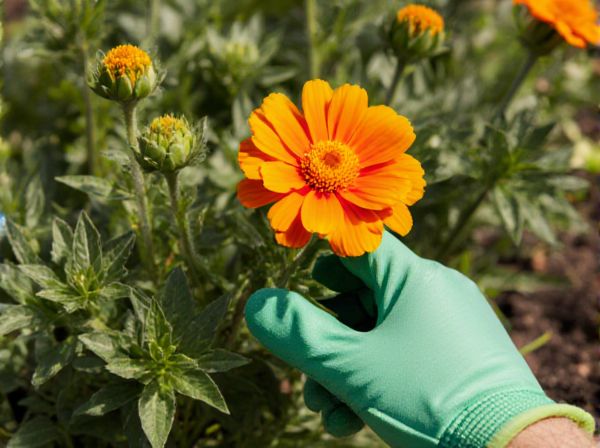
Marigold vs nematode Illustration
Marigolds are highly effective companion plants for controlling nematode populations in the soil due to their natural ability to release toxic compounds that inhibit nematode eggs and larvae. Planting marigolds around vulnerable crops can reduce root-knot nematode damage, improving plant health and overall yield. This natural pest management strategy offers an eco-friendly alternative to chemical nematicides, promoting sustainable gardening and agriculture.
Table of Comparison
| Feature | Marigold | Nematode |
|---|---|---|
| Type | Flowering Plant (Tagetes species) | Microscopic Worms (Phylum Nematoda) |
| Role in Companion Planting | Natural pest repellent, especially root-knot nematodes | Can be harmful pests or beneficial bio-controls depending on species |
| Effect on Soil Health | Improves soil by repelling harmful nematodes | Some species cause crop damage; others promote nutrient cycling |
| Use in Agriculture | Widely used to protect vegetables from nematode damage | Target of biological control; certain beneficial nematodes used as pest control agents |
| Impact on Plants | Protects roots, enhances growth by reducing pest nematode populations | Parasitic nematodes damage roots; beneficial nematodes attack insect pests |
Understanding Marigolds: Nature’s Pest Control
Marigolds contain natural compounds called thiophenes that produce toxic chemicals to suppress nematode populations in the soil, making them an effective companion plant for pest control. Their root exudates disrupt nematode feeding and reproduction, protecting neighboring plants from root damage and disease. Incorporating marigolds into crop rotations or gardens enhances soil health by naturally reducing harmful nematode densities without harmful pesticides.
What Are Nematodes and Why Are They Harmful?
Nematodes are microscopic roundworms found in soil, many of which attack plant roots, causing wilting, stunted growth, and reduced crop yields. Harmful nematodes such as root-knot nematodes penetrate and damage plant tissues, disrupting nutrient and water uptake. Marigold plants release natural compounds into the soil that suppress nematode populations, making them effective biological companions in nematode management.
How Marigolds Repel Nematodes: The Science
Marigolds repel nematodes by releasing bioactive compounds called thiophenes from their roots, which are toxic to these soil-dwelling pests. These naturally occurring chemicals interfere with the nematodes' nervous system, reducing their ability to infect plant roots and disrupting their life cycle. Research shows that planting marigolds in crop rotation can significantly decrease nematode populations and improve soil health.
Best Marigold Varieties for Nematode Control
Marigold varieties such as Tagetes erecta and Tagetes patula have demonstrated superior nematode suppression due to their production of specific bioactive compounds like alpha-terthienyl, which disrupt nematode life cycles. The French marigold (Tagetes patula) is especially effective against Root-Knot Nematodes (Meloidogyne spp.) by exuding nematotoxic substances from its roots, enhancing soil health and reducing pest populations. Selecting these marigold varieties for companion planting can significantly decrease nematode infestations and improve crop yields in nematode-prone soils.
Planting Marigolds: Tips for Maximum Effectiveness
Planting marigolds strategically around vegetable gardens helps repel harmful nematodes by releasing natural biochemicals into the soil that disrupt nematode reproduction. Optimal spacing of marigolds at 8 to 12 inches apart ensures maximum root exudate concentration, enhancing their nematode-suppressing effects. Incorporating French marigold varieties like Tagetes patula offers potent nematicidal properties, making them ideal companions for crops vulnerable to nematode damage.
Companion Planting: Marigolds with Vegetables and Fruits
Marigolds are a powerful companion plant known for their ability to repel nematodes, microscopic pests that damage the roots of vegetables and fruits. Planting marigolds alongside tomatoes, cucumbers, and strawberries can reduce nematode populations, improving crop health and yield. The natural compounds in marigold roots exude substances toxic to nematodes, making them an effective, eco-friendly pest management strategy in vegetable and fruit gardens.
Comparing Marigolds to Other Nematode Solutions
Marigolds offer a natural and eco-friendly method for nematode control by releasing toxic compounds like alpha-terthienyl that disrupt nematode eggs and larvae. Compared to chemical nematicides, marigolds reduce soil toxicity and improve biodiversity, while other organic options such as neem cake and biofumigants may require more frequent application or specific soil conditions to be effective. Integrating marigolds into crop rotations can enhance nematode suppression sustainably, often outperforming single-strategy nematode solutions in long-term soil health management.
Common Mistakes When Using Marigolds Against Nematodes
Planting marigolds too late in the growing season reduces their effectiveness against nematodes, as they need time to suppress pest populations. Using only a single marigold species instead of a diverse mix can limit nematode control due to varying root exudates. Neglecting soil compatibility and proper crop rotation may allow nematode populations to rebound despite marigold cultivation.
Frequently Asked Questions: Marigold and Nematode Interactions
Marigolds produce natural compounds called thiophenes that effectively suppress root-knot nematodes, reducing their population and protecting plant roots. Gardeners often ask if marigolds need to be planted in large quantities to manage nematodes; scientific studies show that interplanting marigolds with susceptible crops provides significant nematode control. Questions arise about the best marigold species for nematode resistance, with Tagetes patula and Tagetes erecta proving most effective in nematode suppression through root exudates.
Creating a Healthy Garden Ecosystem with Marigolds
Marigolds release natural compounds that deter harmful nematodes, effectively reducing root damage and promoting plant health. Their vibrant flowers attract beneficial insects that enhance pollination and biological pest control in the garden ecosystem. Incorporating marigolds supports soil vitality and creates a balanced environment for thriving plants.
Marigold vs nematode Infographic

 gardendif.com
gardendif.com